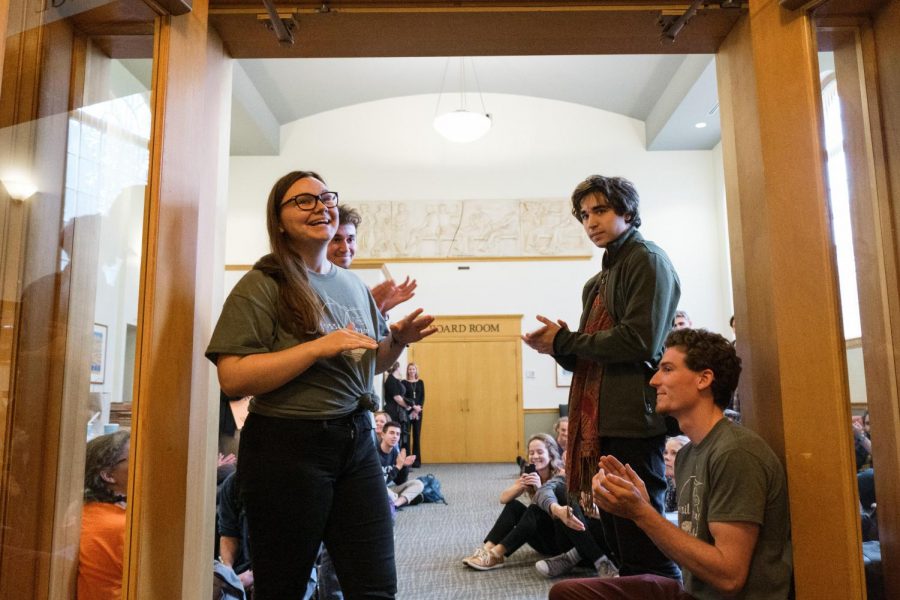Board says no new fossil fuel investments in victory for student activists
Ana Gvozdić ’20 and other Fossil Free Mac activists after announcing the board of trustees’ decision. Photo by Kori Suzuki ’21.
October 4, 2019
The Macalester Board of Trustees voted this afternoon to place a moratorium on private partnerships with oil and gas companies — the culmination of years of student activism, and a landmark victory for the student group Fossil Free Mac (FFM).
Chair of the Board of Trustees Jerry Crawford ’71 announced the board’s decision to a group of five core FFM members in a conference room on the second floor of Weyerhaeuser Hall. Those members, in turn, informed a crowd of students who had gathered for a sit-in a floor below.
Those students, upon hearing the news, erupted in applause.
Macalester currently has approximately $40 million invested in private partnerships with oil and gas companies. The college will not renew those partnerships when they expire, and will not enter into new partnerships unless they result in a net reduction in greenhouse gas emissions.
The trustees have also decided to take several steps beyond what FFM asked for in its proposal.
In addition to the moratorium, the board decided that moving forward, it will use the Environmental, Social, and Governance Criteria to evaluate all of the college’s investments on the basis of sustainability.
Crawford also announced that Macalester will join Climate Action 100 — a group of nearly 400 investors managing $35 trillion in assets who have committed to lobbying corporations to curb emissions and strengthen “climate-related financial disclosures.”
Amherst College is the only other college or university that has signed onto the initiative.
In addition, the college’s Financial Affairs Committee has approved more than a quarter-million dollars to fund the installation of solar panels on the roof of the Leonard Center.
“I cannot think of a group that stuck by their cause and fought for it and kept at it well beyond the time they graduated,” trustee Jon M. Walton ’69 told the group of core FFM members. “That’s pretty remarkable. Thank you for that.”
Anticipation for the board’s decision spread across campus this week, culminating in the FFM-led sit-in outside the Weyerhaeuser boardroom during the meeting.
Scores of Macalester students sat in the building’s lobby, wearing orange and holding signs in support of FFM to greet members of the board on arrival. FFM core member Ana Gvozdić ’20 estimated that more than 200 people participated in the demonstration throughout the afternoon.
Several trustees stopped to engage students in conversation before progressing into the boardroom — some thanking those gathered for their activism, others voicing concerns about the potential economic impacts of divestment.
Ultimately, after several hours of deliberation, the Board made its decision to place a moratorium on direct oil and gas partnerships and significantly expand Macalester’s commitment to sustainability.
“Not every trustee agrees on every single point,” Crawford said, “but I think it’s fair to say that there is near-unanimity on what we decided.”
That near-unanimity, which comes just weeks after the University of California system announced their intention to divest their $13.4 billion endowment fund and their $70 billion pension fund from fossil fuels, was a long time in the making.
FFM’s first push for divestment came in 2015, when it drafted a proposal asking Macalester to fully divest from oil and gas partnerships — including both direct, private partnerships, and mutual funds — which could trade with or profit from the fossil fuel industry.
But before it ever reached the board of trustees, that proposal was rejected by the college’s Social Responsibility Committee (SRC) due to concerns about the potential financial consequences of ending direct oil and gas partnerships.
After that setback, FFM regrouped and, on the advice of board members, narrowed its ask — writing a new proposal calling on Macalester to place a moratorium on its private partnerships with oil and gas companies, but not end its investments in mutual funds that invest in oil and gas companies themselves.
MCSG unanimously endorsed the new proposal, and in April 2018, the SRC voted to recommend it to the Board.
Nearly a year later, in February 2019, the board took up the proposal at an annual retreat held in California. There, the board’s investment committee — responsible for overseeing the college’s financial policies — advised against divestment, effectively stalling a vote among the Board’s full membership.
Given the opportunity to present its proposal in person to the board in May, FFM brought its proposal in front of the student body in the form of an MCSG referendum last April — asking students to clearly demonstrate their support for the moratorium on private partnerships.
The resulting vote — 96 percent in favor of divestment, with more than 1,000 students casting ballots — provided the boost that FFM was seeking.
In May, however, the organization was left disappointed. The board decided to postpone its vote on the divestment, citing its preoccupation with the beginning of the search for President Brian Rosenberg’s replacement, and vowed instead to take the issue up in the fall.
As the board’s October meeting approached, the organization again revved up its advocacy: holding a “teach-in” in the Harmon Room of the DeWitt Wallace Library a week ago Tuesday to preview its strategy with members of the community, and promoting Friday’s sit-in.
In his meeting with FFM core members immediately following the conclusion of the Board’s proceeding, an emotional Crawford praised the nature of FFM’s advocacy at length — saying that he had received “several hundred” emails in advance of the vote.
“The way the students, the alumni, the faculty, the staff have advocated this position has been really impressive,” he said. “You’ve been positive to a fault, passionate, civil… downstairs right now should be taught as the way to respectfully communicate with people.”
Crawford said that the board plans to release a document detailing its new commitments regarding oil and gas partnerships and sustainability at large within 24 hours, and will remain in touch with FFM regarding the particulars of its plans and next steps in the coming weeks.
“It is my hope,” Crawford said, “that you accept our congratulations on an amazing effort.”
“Today, the Macalester community showed up in a big way and we are forever grateful for the presence of all the students, faculty [sic.], staff, alumni and community members who made this moment possible,” FFM wrote in a statement following the decision.
“We are proud to be a part of the global climate justice movement,” it continued. “We will not stop fighting for a more ethical use of Macalester’s investments.”













